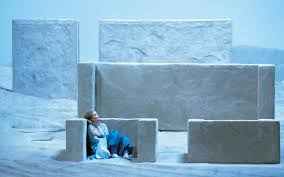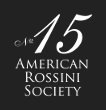American tenor, Randall Bills on his experience with R&Z

The centerpiece of the 2018 Rossini Opera Festival is Ricciardo e Zoraide.
The fact that this opera is so rarely performed made us curious to ask Randall Bills ( who sang the role of Agorante at Wildbad shortly after he had studied at the Accademia Rossiniana) about his experience with this opera. Bills, whom many will remember from the ROF 2012 Armida generously agreed to answer our questions. We are delighted to share his responses; Clearly Randall is a genuine advocate for this opera as well as a true Rossini enthusiast!
Q. Agorante is quite a challenging role. How were you able to master it so quickly? Did your training at the AccademiaRossiniana help in any specific way?
A. I was fortunate to have performed Rodrigo di Dhu in “La donna del lago” about two years before R&Z and both parts are very similar in that they’re the militaristic “bad guy” of the piece. So you have a lot of the same “type” of numbers with big emotions and the music is similar, but still unique unto itself as only Rossini can do! When I did the Accademia Rossiniana the year before this recording it really opened my ears to two concepts: the commitment to singing a true Italian legato, and the style of performing Italian recitative. While those are both life-long(!) studies, I felt that with R&Z (and La Sonnambula) which I was performing right before this recording, I started to feel very comfortable with putting into practice those things I had learned in Pesaro.
Q. The performance in Wildbad was in concert form. That certainly made the “ethnic” issues ( if that is the correct way of putting it) a non-issue, But there must be other aspects of concert performances that make things “easier” for singers?
A. Concert performances remove the aspect of having to memorize the role which is simply less work for us singers! And now a days it also removes the opportunity for, shall we say, “unique” staging concepts from directors who would have you sing upstage, rolling around on the ground, doing handstands and all manner of other things which they think are “interesting” but really just gets in the way of making the most beautiful sounds possible.
I think the essence of the piece is about telling the story of a powerful individual who is used to always getting what he wants, and how he overextends this to his desire for Zoraide. The theme of abuse and corruption of power is pretty universal, and using Africa/the Middle East as the backdrop for this story has more to do with an interest in the “exotic” and “other” that audiences of the time had (think also Armida or L’italiana) than in correctly and thoughtfully representing another culture. Using this setting provided the opportunity for extravagant sets and costumes that took people to a world they were likely never to see first hand. Now that we have the privilege of easily being able to interact and communicate with people from all over the world, I think it is important to be aware about how we portray cultures that aren’t our own. Doing this in concert mitigates that challenge and allows us to focus on the universality of the story.
Now that we have the privilege of easily being able to interact and communicate with people from all over the world, I think it is important to be aware about how we portray cultures that aren’t our own. Doing this in concert mitigates that challenge and allows us to focus on the universality of the story.
Q. What did you find most appealing about this role from the vocal point of view, and is it one you would like to keep in your repertory?
A. This role is appealing because it has everything and I’d be happy to sing it again if the opportunity presents itself! All Rossini asks you to pull out everything you have in your bag of tricks: loud, soft, high, low, fast, slow; it’s all in there. I particularly like the Act II duet with Ricciardo. It’s rare to have such an extended double tenor duet. Usually it’s soprano/tenor (in fact a lot of this R&Z duet reminds me of the Elcia/Osiride duet from “Mosé in Egitto”) so in this opera it was great to share this moment of great music with Maxim Mironov{ also an Accademia graduate, ed.}
Q. Does it evoke any other Rossini roles you have sung?
A. I guess I answered this one a bit above: Mosé Elcia/Osiride duet is very present, if I remember correctly there are also quotes from the Mosé finale, “Armida” Act I Quartet, and “La donna del lago” Rodrigo also sounds familiar. That’s the extent of the “seria” operas that I’ve done, but I’m sure there’s plenty more similarities that the musicology community has found!
Q. What would you like to suggest the listener to keep in mind when they experience this opera for the first time?
Listening to R&Z for the first time is like reading a novel that later gets made into a movie. Read the libretto, know what happens, what people are saying, then listen and let your imagination go wild with how everything looks in your mind’s eye, how it feels to be “there” in the moment of this story, how people are upset, anxious, steadfast, merciful, joyous and how all of that is directed by and mirrored perfectly in this amazing music by Rossini!
Listening to R&Z for the first time is like reading a novel that later gets made into a movie.
Coda: I should also share a funny occurrence in the recording of this project: there’s an offstage banda that plays several times in the score (which was in our production a pre-recorded playback of the orchestra). One evening the playback that happens in the first act ensemble started playing but stopped perfectly at the end of its first 8-bar phrase (there were still several phrases left to go) and there was silence! On stage we all tried to stay in character keeping in the “moment” while we waited to see what would happen. The technicians quickly restarted the banda playback from the beginning of that “cue” and the second time it played all the way through, the “onstage” orchestra came in and we went on with the performance. I think we all managed to make it look like everything was supposed to happen that way, but if you had the score or knew some things about music theory you would have know something had happened. Of course that didn’t make the recording you’ll hear; there’s always some more excitement in live theater!
Randall Bills will be appearing the the Rossini in Wildbad festival in a role debut in Moise. To read more about Randall’s schedule, visit
http://www.randallbills.com/welcome.html
You can also follow him on Facebook and twitter.
Rossini had an earlier interview with Randall which you may enjoy reading:
Image is from the Rossini Opera Festival production with June Anderson.
